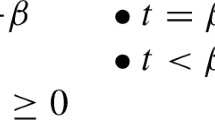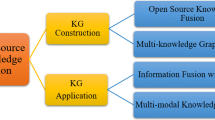Abstract
We study a knowledge logic that assumes that to each set of agents, an indiscernibility relation is associated and the agents decide the membership of objects or states up to this indiscernibility relation. Its language contains a family of relative knowledge operators. We prove the decidability of the satisfiability problem, we show its EXPTIME-completeness and as a side-effect, we define a complete Hilbert-style axiomatization.
Similar content being viewed by others
References
Aumann, R., 1976, “Agreeing to disagree,” Annals of Statistics 4(3), 1236–1239.
Balbiani, P., 1997, “Axiomatization of logics based on Kripke models with relative accessibility relations,” pp. 553–578 in Incomplete Information: Rough Set Analysis, E. Orłowska, ed., Heidelberg: Physica Verlag.
Cresswell, M., 1988, “Necessity and contingency,” Studia Logica 47(2), 145–149.
Demri, S., 1997, “A completeness proof for a logic with an alternative necessity operator,” Studia Logica 58(1), 99–112.
Demri, S. and Gabbay, D., 1998, “Onmodal logics characterized by models with relative accessibility relations,” submitted.
Fagin, R., Halpern, J., Moses, Y., and Vardi, M., 1995, Reasoning about Knowledge, Cambridge, MA: The MIT Press.
Gargov, G. and Passy, S., 1990, “A note on boolean modal logic,” pp. 299–309 in Summer School and Conference on Mathematical Logic’ 88, P. Petkov, ed., New York: PlenumPress.
Goranko, V. and Passy, S., 1992, “Using the universal modality: gains and questions,” Journal of Logic and Computation 2(1), 5–30.
Halpern, J. and Moses, Y., 1992, “A guide to completeness and complexity for modal logics of knowledge and belief,” Artificial Intelligence 54, 319–379.
Hemaspaandra, E., 1996, “The price of universality,” Notre Dame Journal of Formal Logic 37(2), 173–203.
Hintikka, J., 1962, Knowledge and Belief, Ithaca, NY: Cornell University Press.
Humberstone, L., 1995, “The logic of non-contingency,” Notre Dame Journal of Formal Logic 36(2), 214–229.
Johnson, D., 1990, “A catalog of complexity classes,” pp. 68–161 in Handbook of Theoretical Computer Science, Volume A, Algorithms and Complexity, J. van Leeuwen, ed., Amsterdam: Elsevier, 1990.
Konikowska, B., 1997, “A logic for reasoning about relative similarity,” Studia Logica 58(1), 185–226.
Kuhn, S., 1995, “Minimal logic of non-contingency,” Notre Dame Journal of Formal Logic 36(2), 230–234.
Lemmon, E., 1965, Beginning Logic, London: Chapman and Hall.
Makinson, D., 1966, “On some completeness theorems in modal logic,” The Journal of Symbolic Logic 12, 379–384.
Montgomery, H. and Routley, R., 1966, “Contingency and non-contingency bases for normal modal logics,” Logique et Analyse 9, 318–328.
Montgomery, H. and Routley, R., 1968, “Non-contingency axioms for S4 and S5,” Logique et Analyse 11, 422–424.
Orłowska, E., 1989, “Logic for reasoning about knowledge,” Zeitschrift für mathematische Logik und Grundlagen der Mathematik 35, 559–572.
Pawlak, Z., 1981, “Information systems theoretical foundations,” Information Systems 6(3), 205–218.
Pratt, V., 1979, “Models of program logics,” pp. 115–122 in Proceedings of the 20th IEEE Symposium on Foundations of Computer Science.
Vakarelov, D., 1991, “Modal logics for knowledge representation systems,” Theoretical Computer Science 90, 433–456.
Valiev, M., 1988, “Interpretation of modal logics as epistemic logics,” pp. 76–77 in Proceedings of the Conference of Borzomi [in Russian].
Author information
Authors and Affiliations
Rights and permissions
About this article
Cite this article
Demri, S. A Logic with Relative Knowledge Operators. Journal of Logic, Language and Information 8, 167–185 (1999). https://doi.org/10.1023/A:1008227432405
Issue Date:
DOI: https://doi.org/10.1023/A:1008227432405




